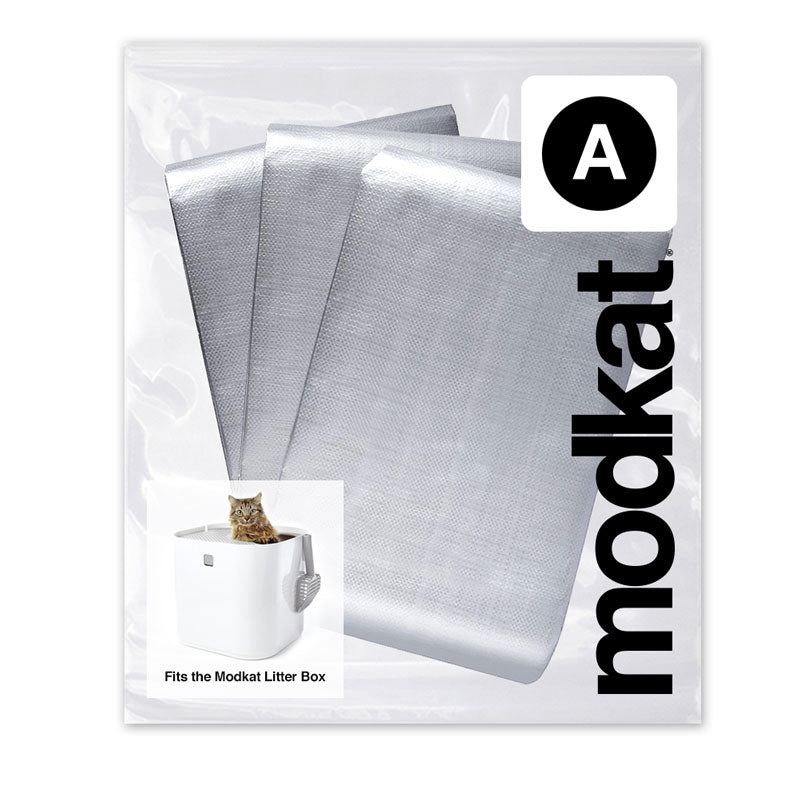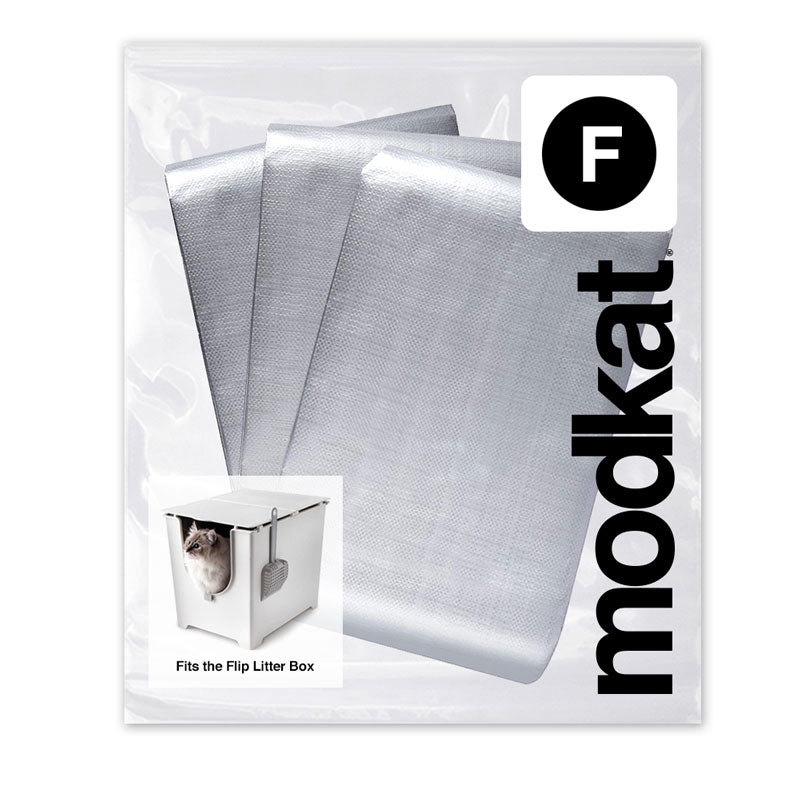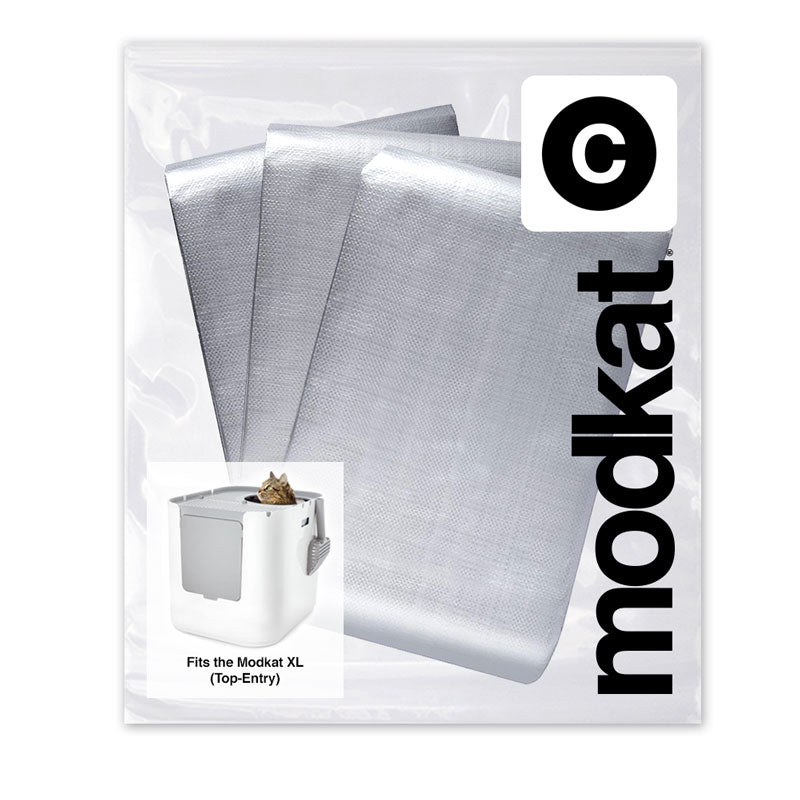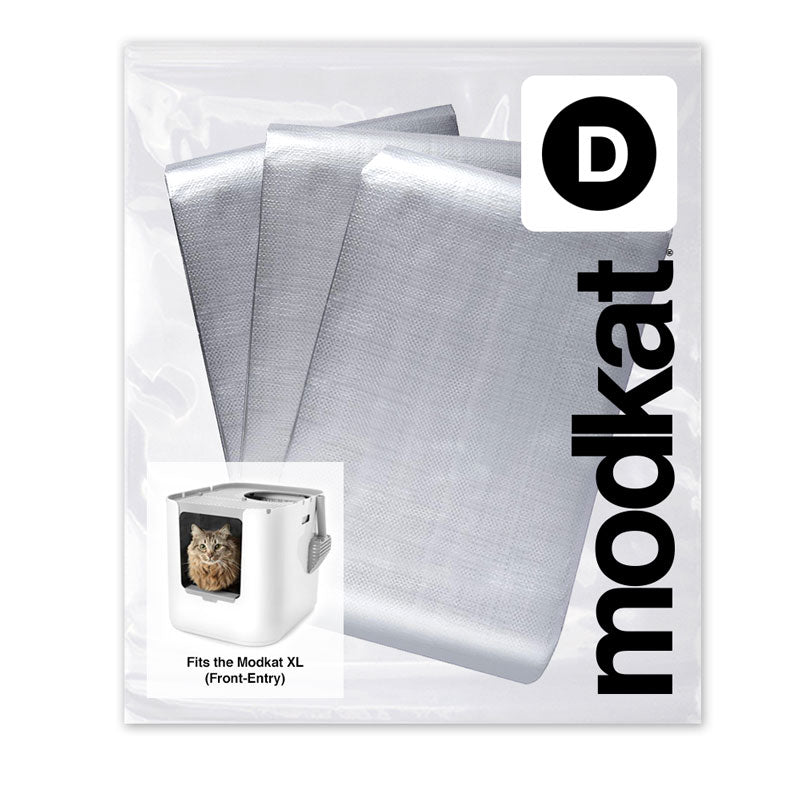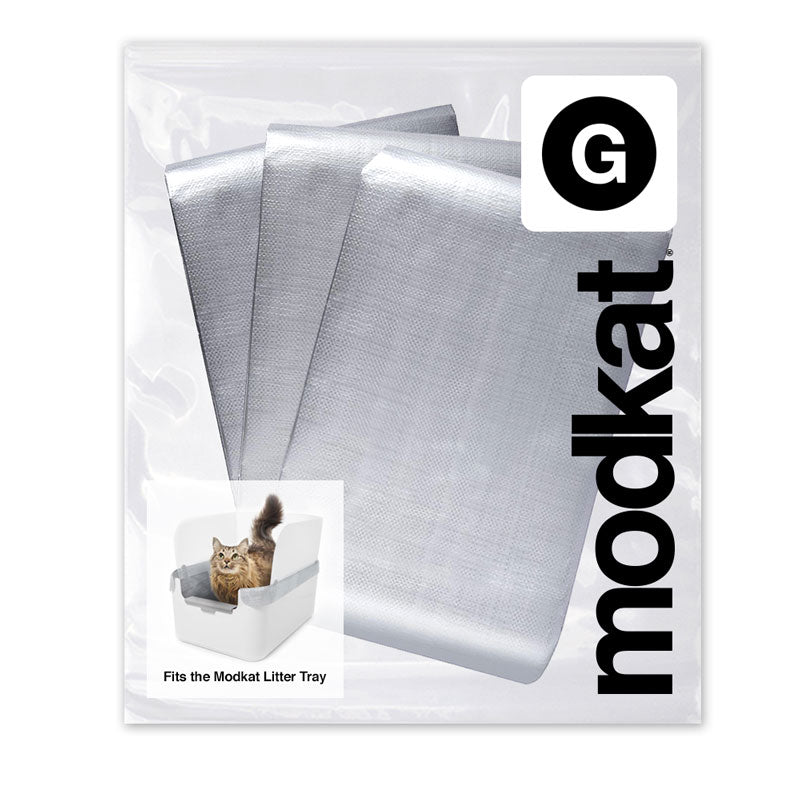Your Cart is Empty
$12 CAD shipping on orders over $62 CAD
$12 CAD shipping on orders over $62 CAD
Litter Boxes
Accessories
Best products for controlling cat litter odor.
Pic: @moon_thecat
Cat urine is potent. Catching even a whiff of it can make your eyes water and your nose run.
Feline pee stinks because it's highly concentrated. Our domestic cats' ancient ancestors adapted biologically to living in the desert. As a result, they began to absorb a lot of water from urine to stay hydrated. That's why your cat can get by with just a few laps of liquid from her dish every day.
Here ends the science lesson.
Now we know why cat pee chokes you up, so let's talk about how to make your house smell fresh and your cat feel happy.
When cats take a whiz on carpet or when urine soaks through to a subfloor, you've got a serious cleanup task to do. That's why the very best place to start odor control is with a clean and roomy litter box holding about two inches of quality cat litter. A box and a litter brand your cat will use can nearly eliminate the possibility of him doing business outside the box.
Notice we're not talking about lilac-infused litter pellets or heavy-scented plug-ins. Most cats hate those smells. We're recommending inoffensive, planet-friendly, cat-approved, and totally effective ways to get cat litter odor under control.
Let's look at science again:
When researchers at Iowa State University learned that 25% of American homes contain a pet cat and 48% use carpet on the floor, they knew they had a great research topic. Sure enough, these scientists discovered that all the cleaning products they tested eliminate odors right away. But within two weeks, those odors were back — accompanied by new, worse smells. Cat pee doesn't just go away like magic no matter what you spray on it.
Therefore, the best odor control is a clean, spacious litter box your cat will use every time he or she needs to do business. Even if you provide your cat with the perfect box, however, odors have a tendency to leak out.
What can you do about cat litter odor control?
Take a deep breath. We're about to answer that question. Scientifically.
What is the best odor blocking cat litter?
Many brands of cat litter contain odor-eliminating compounds such as baking soda or charcoal. In fact, some cat litters are so good at odor control that household management experts recommend using them to refresh rugs, curtains, quilts, and shoes.
The secret to odor control is activated carbon. What, you may well ask, is activated carbon?
It's carbon — basically charcoal — filled with holes that increase its surface area. And here's the best bit, it actually absorbs odor. That's not pure marketing speak; it's science. Activated carbon absorbs odors. Some enterprising entrepreneurs even put it in the back of underwear for humans to control the smell of methane emissions there. Good luck to them.
At Modkat, we chose activated carbon as the primary ingredient for our litter box filter kit. Other pet product suppliers use it in aquarium filters. Some doctors even employ activated carbon to absorb the stomach contents of poisoning victims in the hospital.
For your cat litter box, you can either buy litter that includes activated carbon already mixed in — the best cat litter for odor control on the market — or you can invest in a separate container of activated charcoal and do the mixing yourself. Add a single scoop to a box full of litter. It should double the life of your pellets. While you can use other charcoals that aren't activated, you probably don't want to. They rank pretty low on the effectiveness scale.
If activated charcoal isn't your thing, you can try baking soda. This handy chemical features a low pH balance, making it a base, so it neutralizes many odors that have a high pH balance and are acidic. Some cat litters come with baking soda mixed in. If you prefer, you can sprinkle soda on top of your regular litter.
Neither activated charcoal nor baking soda will harm your cat or kitten, and neither causes environmental damage. Clay litters, on the other hand, do leave a trail of environmental destruction behind them throughout their lifecycle. So the best cat litter for odor control might be hazardous for the earth.
A good solution is to try mixing baking soda or activated charcoal into an environmentally friendly litter, thus saving the earth, your cat's health, and your olfactory nerve all at the same time.
Control cat litter box odor.
In addition to choosing an odor-controlling litter option, you can try other things to minimize litter box smells.
- Choose the best cat litter box for odor control. A covered box such as the original Modkat or Modkat XL can go a long way toward keeping odors contained. And yes, cats approve of covered boxes. Scientific data shows 85% of cats choose a covered box when offered one.
- Scoop the litter daily. Best if you can scoop right after your kitty does her biz in the box, but once a day should suffice to keep odors to a minimum. If you're new to the cat-loving life (welcome!), you'll want to invest in a sturdy, ergonomic scoop that's designed to get into the nooks and crannies of your particular box.
- Refill the box as needed. Your cat will do best with about two inches of litter in the box. More than that can result in a lot of kicking, spraying, and litter tracking. Less can mean that your cat's doesn't get buried. Since you'll be scooping litter at least once a day, you'll probably need to top off your cat's box a couple of times a week.
- Wash the litter box weekly. Warm water and a gentle dishwashing detergent will take care of most odors and streaks left inside a nice plastic box. You don't want to use bleach or another harsh cleanser since some cats have allergic reactions to these.
- Refresh the litter weekly. Dump your litter every week, and replace the whole shebang with fresh pellets. A heavy liner can make this chore a snap. Just pull up the liner, dump out the goods, replace the liner, and refill the box. To make this system work, though, you'll need a tough liner with a hook-and-eye system that holds it in place. (Pssst: we've got just the thing.)
- Replace your odor control filter regularly. Whether you're using a sophisticated system like ours or just dumping baking soda in cheesecloth and hanging it near the box, you've got to refresh your filter when it runs out of power.
A clean, covered box filled with bright, crisp pellets and a healthy sprinkle of activated carbon or charcoal can render cat litter odors nearly undetectable. And it's all done without chemical sprays or add-ins that drive cats crazy. (Who wants to smell a lovely combo of potpourri and cat butt anyway? Go with the natural solutions.)
What is the best way to eliminate cat odor?
It's not just cat pee that stinks. Like other pets, cats carry the distinctive aroma of — well, of an animal.
That's not to say cats aren't clean. Anyone who lives with a cat knows how much of his day their pet spends grooming himself — 30-50 percent. But even the most immaculate cat smells like a cat because he's a cat, and cats don't smell like flower gardens.
How can you help minimize your cat's natural body odor?
You can wash a dog, and birds love baths. But cats? Should you actually bathe a cat? The National Cat Groomers of America says yes! This organization recommends bathing and blow drying your pet cat once every 4-6 weeks. Their advice probably does not extend to every cat, however. If you're sure your cat would leave your home in shreds from the trauma of a bath, don't do it. You know your animal.
But if you're raising a kitten, you can acculturate these babies to enjoy submerging themselves in water (tigers swim in rivers, after all). When in doubt, check with your vet or feline behaviorist.
Whether your cat ever likes baths or not, he or she will probably enjoy short, weekly sessions with the brush. Pick a sturdy brush with bent metal teeth to comb out tangles, remove dander, and prevent mats. Brushing is especially important for long-haired cats that can easily get mats in their beautiful fur.
If you parent a hairless cat, be sure to wash his sweaters, hoodies, scarves, and other wardrobe accessories with a pet-safe laundry detergent. Same goes for blankets and cloth toys for all varieties of cats and other household pets.
Now if your cat smells especially malodorous, make an appointment with your vet. Your pet could need treatment for a health or dental condition.
Clean messes quickly and thoroughly.
What if an accident happens? Your cat makes a mess on the floor, your laundry pile, or your bed. Do these two things:
- Clean up the mess using an enzyme-based cleanser. Experts recommend paper towels to blot urine, remove feces, or dispose of vomit. Then try an enzyme-based cleaner and a pet-odor-and-stain remover. Be sure to keep your cat away from the area as long as possible so you minimize the chance of a recurrence.
- Call your vet for a checkup. Healthy cats rarely eliminate outside the litter box unless there's a problem. If you've made sure the box is clean, accessible, and unoccupied, your cat may be living with a health condition that a vet can easily solve.
The best cat litter for odor control is the litter your cat will use without a fuss. We suggest aiming for an environmentally friendly option that includes a healthy mix of baking soda or activated charcoal. You can add in these products yourself if you like.
As always, a clean litter box is the first prescription for a healthy, happy cat. And that's the best prescription for a happy, healthy life!

Shop the Modkat Litter Box Filter Kit »
Purrr News.
Join our email list and get exclusive access to new products, the best cat litter box health articles, and 10% off your first order.
Products related to this blog:
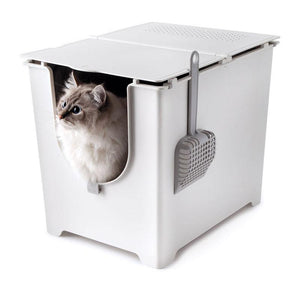
4086 reviews
"This litter box keeps everything in, nothing gets out the sides."
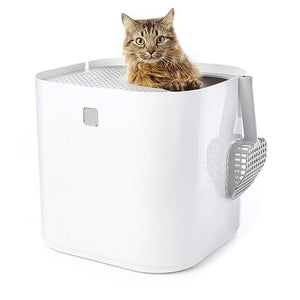
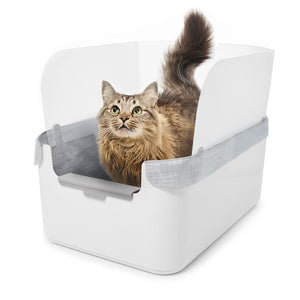
779 reviews
"My beautiful ragdoll cat and I both love the new Modkat Litter tray!"
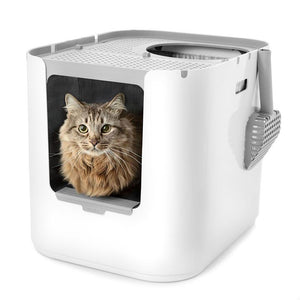
1894 reviews 
"It looks nicer than any other hooded or open option we considered."












